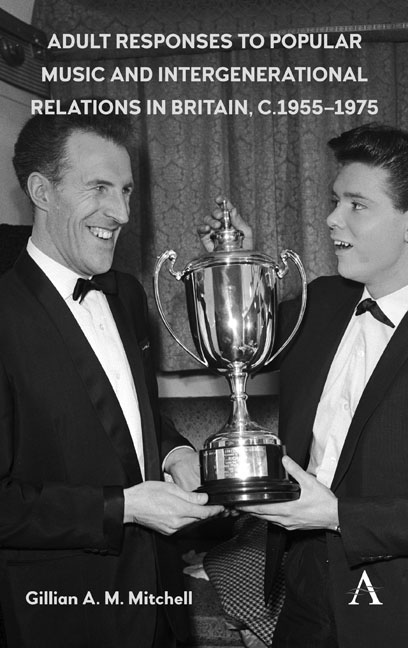Book contents
- Frontmatter
- Contents
- Acknowledgements
- Introduction
- Chapter One ‘You Go Half Way, Don't You?’ Family Life, Generational Identity and Popular Music
- Chapter Two ‘To Have Done Something’: The Christian Churches, Youth Clubs and Popular Music
- Chapter Three ‘You've Got to Be Able to Entertain People’: The Encounter between Popular Music and the Worlds of Variety and ‘Light Entertainment’
- Conclusion
- Notes
- Bibliography
- Index
- Frontmatter
- Contents
- Acknowledgements
- Introduction
- Chapter One ‘You Go Half Way, Don't You?’ Family Life, Generational Identity and Popular Music
- Chapter Two ‘To Have Done Something’: The Christian Churches, Youth Clubs and Popular Music
- Chapter Three ‘You've Got to Be Able to Entertain People’: The Encounter between Popular Music and the Worlds of Variety and ‘Light Entertainment’
- Conclusion
- Notes
- Bibliography
- Index
Summary
‘Call it music? This is TNT!’ declared the Daily Mail correspondent Don Iddon in September 1956. He was referring to rock ‘n’ roll, the American musical trend which had suddenly begun to feature prominently in British headlines. As Rock Around the Clock, an otherwise innocuous film- vehicle for American musician Bill Haley, was screened in cinemas in the autumn of that year, press reports of youngsters ‘jiving in the aisles’, vandalizing cinemas and generally participating in ‘riots’ which were, frequently, spearheaded by ‘Teddy Boys’ proliferated. For almost two weeks, readers encountered stories of rowdy ‘teenagers’ aiming fire extinguishers at outraged ushers, of widespread disruption in the streets of Manchester and South London and of Alsatian dogs and plain clothes police officers patrolling cinemas. The incidents petered out relatively swiftly, constituting a typical ‘nine- day wonder’ for commentators, most of whom ultimately refocused their attentions on the rather more significant crisis developing simultaneously in Suez. Nevertheless, with their inflammatory language and palpable outrage, the Daily Mail's initial reports on rock ‘n’ roll, which described the genre as ‘cannibalistic […] music of the delinquents’, both ‘deplorable’ and ‘tribal’ in character, certainly set the tone for much of the press coverage of the music. Competitors from the Daily Mirror to the Manchester Guardian duly produced various reports on ‘jiving rioters’ ‘whipped into a frenzy’ and ‘savages drunk with coconut wine’ possessed by ‘the spirit of the rock’. However, the Daily Mail's original coverage remains particularly infamous, cited not merely as evidence of initial press hostility towards rock ‘n’ roll, but also as a particularly ‘apocalyptic’ articulation of adult responses to the music in society more broadly. The papers seemed to confirm this by printing letters from older readers whose appraisals of the music resembled those of Iddon in tone and style; while some believed that youngsters ought to receive ‘medical treatment’ for their enjoyment of this music, others saw the incidents as ‘a terrible indictment’ of modern life and a threat to the cultural integrity of Britain. The dangers inherent in the licentious ‘jungle beat’ of the music were repeatedly highlighted. Many who were young at the time recalled similar reactions from their own parents and elders. Yet, for many of these youngsters, there was something almost thrilling and galvanizing about the disapprobation which their elders expressed towards their musical choices.
- Type
- Chapter
- Information
- Publisher: Anthem PressPrint publication year: 2019



